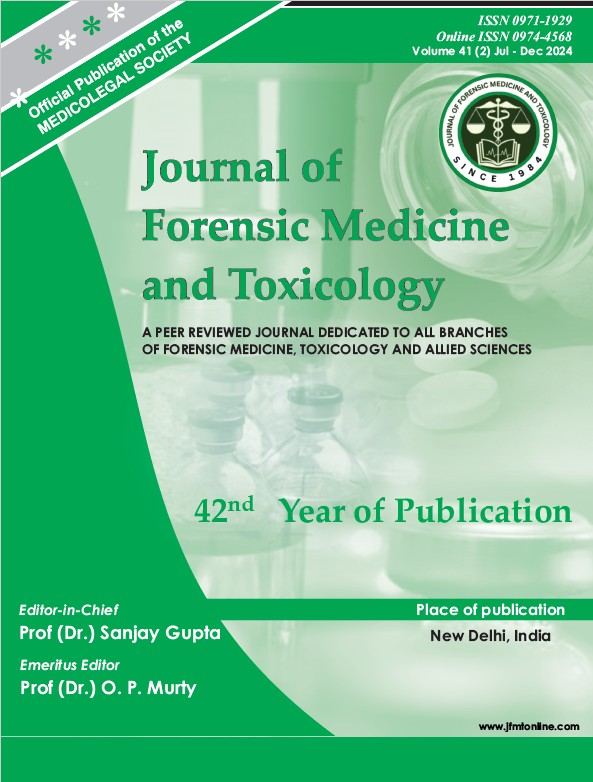MAYER-ROKITANSKY-KÜSTER-HAUSER SYNDROME- AN INCIDENTAL FINDING DURING AUTOPSY: A CASE REPORT
Keywords:
Mayer-Rokitansky-Küster-Hauser syndrome, Müllerian aplasia, Infertility, Autopsy, SuicideAbstract
Introduction: Mayer-Rokitansky-Küster-Hauser syndrome is a congenital abnormality that affects the uterus and the upper two-third of the vagina. It is expected to affect 1 in every 5000 live births. The syndrome is characterized by aplasia of the Müllerian duct (uterus and upper two-third of the vagina) in a person with karyotype 46, XX with female phenotype characteristic of primary amenorrhea in adolescence. But some people present with other complaints such as infertility, dyspareunia, or periodic pain. There are two types of Mayer-Rokitansky-Küster-Hauser syndrome: typical (isolated uterovaginal aplasia) and atypical (associated with extragenital symptoms). Renal, bone, ear, and heart abnormalities are examples of extragenital anomalies. Case: We are hereby presenting the case of a 26 year old female brought for medico legal autopsy. On careful examination of genital organs, the incidental finding of MRKH syndrome was observed. Conclusion: In every case, it is important to review the deceased’s medical history, psychological condition before death by speaking with family members and friends, and to examine each and every organ during the autopsy. Else, rare incidental findings may go unnoticed.
Downloads
References
Hoffman BL, Schorge JO, Bradshaw KD, Halvorson LM, Schaffer JI, Corton MM. Williams Gynecology.3rd ed. New York: McGraw-Hill Professional; 2016.p.420.
Kumar S, Padubidri VG, Daftary SN, editors. Howkins & Bourne: Shaw’s Textbook of Gynaecology, 18th Edition. New Delhi, India: Elsevier; 2022.p.129-31.
Nunes RD. Mayer-Rokitansky-Kuster-Hauser Syndrome - Case report. ObstetGynaecol Cases Rev. 2015;2(3).
Guerrier D, Mouchel T, Pasquier L, Pellerin I. The Mayer-Rokitansky-Küster-Hauser syndrome (congenital absence of uterus and vagina) – phenotypic manifestations and genetic approaches. J Negat Results Biomed. 2006;5(1):1.
Al Dandan O, Hassan A, Alsaihati A, Aljawad L, Almejhim F. A rare form of Mayer-Rokitansky-Küster Hauser syndrome: Case report and review of literature. Case Rep Womens Health. 2019;24:e00137.
Oppelt P, Renner SP, Kellermann A, Brucker S, Hauser GA, Ludwig KS, et al. Clinical aspects of Mayer-Rokitansky-Kuester-Hauser syndrome: recommendations for clinical diagnosis and staging. Hum Reprod. 2006;21(3):792–7.
Herlin MK, Petersen MB, Brännström M. Mayer Rokitansky-Küster-Hauser (MRKH) syndrome: a comprehensive update. Orphanet J Rare Dis. 2020;15(1):214.




